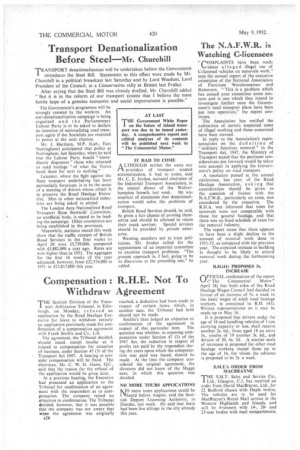Transport Denationalization Before Steel—Mr. Churchill T RANSPORT denationalization will be undertaken
Page 30

If you've noticed an error in this article please click here to report it so we can fix it.
before the Government introduces the Steel Bill. Statements to this effect were made by Mr. Churchill in a political broadcast last Saturday and by Lord Woolton, Lord President of the Council, at a Conservative rally at Bristol last Friday.
After saying that the Steel Bill was already drafted, Mr. Churchill added " But it is in the reform of our transport system that I believe the most fertile hope of a genuine economic and social improvement is possible."
The Government's programme will be strongly resisted by the workers. An anti-denationalization campaign is being organized a ri d the Parliamentary Labour Party is to be asked to declare its intention of nationalizing road transport again if the Socialists are returned to power at the next election.
Mr. J. Harrison, M.P. (Lab., East Nottingham) anticipated that policy at Nottingham, last Saturday, when he said that the Labour Party would "immediately dispossess" those who returned to road haulage "of what the Tories hand them for next to nothing."
Leicester, where the fight against the State transport undertaking has been particularly ferocious, is to be the scene of a meeting of drivers whose object is to preserve the Road Haulage Executive. Men in other nationalized industries are being asked to attend.
The London Area Nationalized Road Transport Shop Stewards' Committee, an unofficial body, is stated to be leading the campaign. Other committees are being established in the provinces.
Meanwhile, statistics issued this week show that the traffic receipts of British Road Services in the four weeks to April 20 were £5,739,000, compared with £5,882,000 a year ago. Rates are now higher than in 1951. The aggregate for the first 16 weeks of the year advanced, however, from £22.554,000 in 1951 to £23,817,000 this year.
IT HAD TO COME LTHOUGH neither the users nor .C-1, providers of transport wanted nationalization, it had to come, said Mr. C. E. Jordan, national chairman of the Industrial Transport Association, at the annual dinner of the Wolverhampton branch, last week. He was sceptical of statements that denationalization would solve the problems of transport.
British Road Services should, he said, be given a fair chance of proving themselves and should be allowed to retain their trunk services. Special services should be provided by private enterprise.
Warning members not to trust politicians, Mr. Jordan called for the appointment of an impartial committee to examine transport problems. "The .present approach is, I feel, going to be as disastrous as the preceding one," he added.




















































































